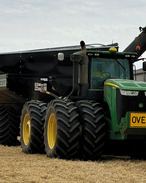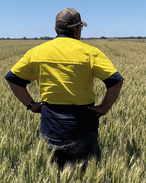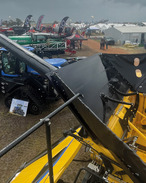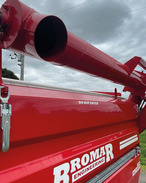The report, ‘Australian Grains Baseline and Mitigation Assessment', found that the Australian grains industry exhibits low greenhouse gas emissions for each tonne of grain produced compared to other grain producing regions and countries, including the European Union, United States, Canada, Russia and Ukraine.
GRDC chair and Goondiwindi, Queensland, grain grower, John Woods, said the CSIRO was commissioned to prepare the report to establish a detailed and robust greenhouse gas (GHG) emissions baseline for the Australian grains sector and explore mitigation opportunities that maintain or increase profitability.
"The risks of climate change and climate variability including low rainfall and increased temperatures to the Australian grains sector are significant," Woods said.
"Yet climate challenge creates new opportunities for innovation and growth for the agricultural sector, and with the right approach, Australia's grain sector can prosper in a changing environment.
"Grain growers manage about four per cent of the Australian continent with 22,300 grain farms covering an estimated 31 million hectares, so they play an important part in delivering economic and environmental outcomes on behalf of the broader community," Woods said.
CSIRO senior research scientist, Dr Maartje Sevenster, led the 18-month research initiative and co-authored the report. She said the information provided essential baseline data around the current level of greenhouse emissions for the Australian grains industry.
"Having robust reference information for greenhouse gas accounting and assessing priorities for mitigation is essential. This type of information will also be increasingly important for the Australian grains industry in maintaining access to global markets," Dr Sevenster said.
To identify a GHG emissions baseline for the Australian grain production sector, CSIRO scientists used the 2005 baseline for Nationally Determined Contributions under the Paris Agreement (COP 21). Their research found:
- Reducing overall net emissions of the Australian grains industry by 2030 is unlikely to be achieved without decreasing Australian production.
- The report notes that approximately 40 per cent are scope three emissions external to the farm gate, which include the emissions produced in the manufacture of the inputs growers use such as fertiliser.
- Emissions arising from Australian grain production in 2005 were 13.75 million tonnes CO2~e or 315 kg of CO2~e per tonne of Australian grain produced.
- About 60 per cent of these emissions are direct farm emissions.
- On-farm emissions from Australian grain accounted for 1.7 per cent of all of Australia's national emissions reported in 2005-06.
- Any reduction in Australian grain production is likely to result in an increase in grain production in regions of the world that are not able to achieve the low emissions intensity of Australia, increasing global grains emissions.
























